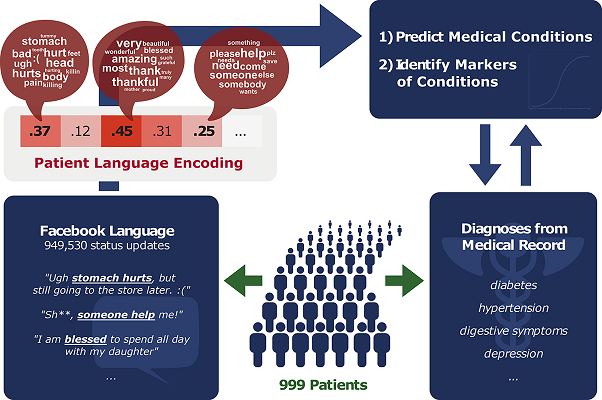
Do you know your Facebook profile can tell about your medical condition? According to a recent study, the researcher was able to predict 21 broad categories of a medical condition like diabetes and anxiety just by studying their Facebook profile.
Study was published on PLOS ONE, a peer-reviewed open access scientific journal published since 2006.
The research concludes “we identified that patients’ Facebook status updates can predict many health conditions, suggesting opportunities to use social media data to determine disease onset or exacerbation and to conduct social media-based health interventions.”
Evaluating the predictability of medical conditions from social media posts
Over two billion people regularly share information about their daily lives over social media, often revealing who they are, including their sentiments, personality, demographics, and population behavior.
Because such content is constantly being created outside the context of health care systems and clinical studies, it can reveal disease markers in patients’ daily lives that are otherwise invisible to clinicians and medical researchers.
Social media content has been shown to contain valuable health signals, though mostly at the population level.
For example, Twitter has been used to surveil disease outbreaks, predict heart disease mortality rates, and to monitor public sentiment about health insurance.
Also read: Mental health actually improves in seniors using social media
Research methodology
Study was conducted over 999 consenting participant who were also willing to share there Electronic Medical Record (EMR).
Researcher analysed previous Facebook status updates of all the 999 participants and interlinked the data with EMR.
The researchers identified the language in the Facebook update that likely indicated the characteristic behavior or symptoms of certain diagnoses. For example, posts that mentioned “drink,” “drunk” or “bottle” were marked for alcohol abuse.
This identified symptoms form Facebook post is then compared with the collected EMR. Diagnoses from participant’s EMR were grouped into 21 categories (all categories had at least 30 participants).

Result of the study
Result of the study clearly indicates that facebook status updates gives and idea of medical condition you may have. Here’s the takeout of the result.
- All 21 medical condition categories were predictable from the Facebook language.
- Out of 21 categories,18 categories were better predicted from a combination of demographics and Facebook language than by demographics alone.
- 10 categories were better predicted by Facebook language than by the standard demographic factors (age, sex, and race).
Social media data are a quantifiable link into the otherwise elusive daily lives of patients, providing an avenue for study and assessment of behavioral and environmental disease risk factors.
Analogous to the genome, social media data linked to medical diagnoses can be banked with patients’ consent, and an encoding of social media language can be used as markers of disease risk, serve as a screening tool, and elucidate disease epidemiology.
Resource
- Evaluating the predictability of medical conditions from social media posts. Published: June 17, 2019: https://journals.plos.org/plosone/article?id=10.1371/journal.pone.0215476#pone.0215476.ref014
Dr Sunit Sanjay Ekka is a physiotherapist in practice for the last 15 years. He has done his BPT from one of the premium Central Government physiotherapy colleges, ie, SVNIRTAR. The patient is his best teacher and whatever he gets to learn he loves to share it on his Youtube channel and blog.





